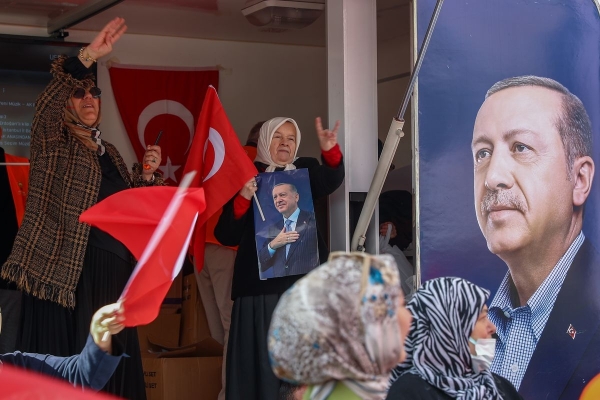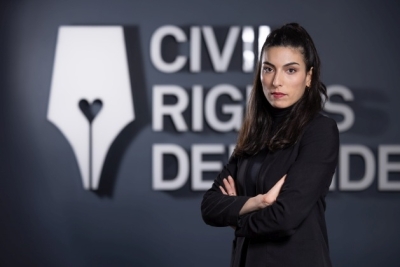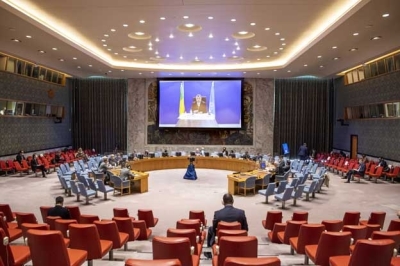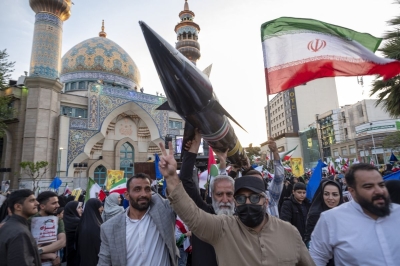In April, President Recep Tayyip Erdoğan showed off Turkey’s first drone, tank, and helicopter carrier. It was a not-so-subtle message weeks before the Turkish elections: Turkey is flexing its power, its independence, and Erdoğan is the guy making it happen.
It turns out, Turkish voters seem to want some version of Erdogan’s nationalism.
Erdoğan prevailed in a May 28 runoff against opposition candidate Kemal Kiliçdaroğlu, winning another presidential term, according to unofficial results from Anadolu, the state news agency. Erdoğan is ahead with 52.1 percent of the vote, and Kiliçdaroğlu trails behind with 47.9 percent, with most of the votes counted.
The outcome seemed almost inevitable after Erdoğan led in the first round of elections, despite a fairly united opposition that promised to restore Turkish democracy and repair ties with the West.
Of course, it wasn’t a completely fair fight. Erdoğan largely controls the media and state resources, and he exercised those levers ahead of the election. Erdoğan’s built-in advantage, with a side of election irregularities, almost guaranteed he’d win, and he did.
Erdoğan is set to become Turkey’s long-serving leader, and his reelection will have profound implications for Turkey — and the rest of the world. Erdoğan has tried to exert Turkish power in the region and beyond, pursuing a nonaligned and assertive foreign policy. He believes in a multipolar world, with Turkey as a power among others. He has reoriented Ankara away from — but not completely abandoned — the West, using his leverage to balance Turkey’s relationships, but also to play competitors off each other in ways that benefit Turkey’s (and Erdoğan’s own) interests.
These are things like showing off Turkey’s military hardware, as Erdoğan seeks to build up the country’s homegrown defense industry as a sign of its global independence. Or things like launching an operation into northeastern Syria. Or things like picking fights with the North Atlantic Treaty Organization (NATO), of which Turkey is a member, even if Erdoğan doesn’t always act like it. Or things like getting closer to Russian President Vladimir Putin, buying Russian weapons systems, and continuing to buy Russian oil after Moscow launched its war in Ukraine — even as he’s selling Kyiv battlefield drones.
“He wants to see the birth of the Turkish Empire, the belief that Turkey is destined to be a hegemon, regionally, but also a global power in [the] 21st century,” said Asli Aydintaşbaş, visiting fellow in the Center on the United States and Europe at the Brookings Institution. “There is a bit of a new imperial sentiment, obviously, but he has convinced the Turkish public that this is the course Turkey should take.”
Erdoğan uses this nationalistic vision for his domestic political advantage. He did so before the election, and experts said, he is unlikely to reverse course now, even if his power is secure. For Erdoğan, said Sibel Oktay, associate professor of political science at the University of Illinois Springfield, “foreign policy is not just about prioritizing national security, but also ensuring that whatever you do at the foreign domain somehow strengthens your hands at the next election.”
Even if Erdoğan’s nationalism have shielded his popularity, the crises that came close to unseating him in this election are not dissipating, and are likely to get more destabilizing. Turkey’s economy is in shambles. Parts of the country are still recovering from a catastrophic earthquake earlier this year. Erdoğan has built the state around himself, dismantling democratic institutions and institutionalizing corruption and self-dealing.
Erdoğan will have to deal with these crises, even as he seeks to assert Turkey’s influence around the world. Tumult at home might force him to temper his ambitions — or it could fuel them, as he seeks success abroad to avoid what he cannot, or will not, fix at home.
“He’s just won a mandate from voters who have made it very clear that they support Erdoğan — despite everything that’s happened to the economy,” said Nicholas Danforth, editor at War on the Rocks and senior non-resident fellow at the Hellenic Foundation for European and Foreign Policy.
It is a very nationalist voter base, Danforth said, that “appears very willing to pay the economic price that they think — and that Erdoğan insists — is necessary to follow his foreign-policy vision.”
Erdoğan is probably not going to become a great ally all of a sudden
Erdoğan’s belief in a multipolar world means he doesn’t quite buy into the Western-led order. Turkey is a longstanding NATO member, but Erdoğan has tried to forge a more independent foreign policy, one that weens Ankara off its Washington dependence. In doing so, Erdoğan tapped into a anti-Westernism in Turkish society and supercharged it.
His hostility toward the United States, in particular, intensified after a 2016 coup attempt against him. Erdoğan blames Fetullah Gülen, a cleric who has lived in exile in Pennsylvania since 1999, for orchestrating the power grab. Erdoğan has insisted the US extradite Gülen, which it has not done, saying Turkey lacks evidence. (Gülen denies involvement.)
The rift has deepened from there. Turkey detained an American pastor on trumped up terrorism charges in 2016, which led to a lopsided trade spat until the pastor’s release two years later. In Syria, the United States partnered with Syrian Kurdish fighters to battle ISIS, which Erdoğan sees as an existential threat because of its ties to the Kurdistan Workers Party (PKK), a Kurdish separatist group.
In 2017, Turkey brokered a deal with Russia to buy its S-400 surface-to-air missile defense system, which came amid warming ties between Ankara and Moscow. The United States warned Turkey that a NATO ally probably shouldn’t go off and buy Moscow-made military stuff, but Turkey did it anyway. The US imposed sanctions on Turkey, and kicked it out of its fighter jet program.
Other issues have driven a wedge between Turkey and the West, but Erdoğan’s do-what-he-wants foreign policy has really been on display during the Ukraine war.
Turkey has not gone along with other NATO allies to sanction Russia, and has been scooping up cheap Russian oil. Most significantly, Turkey has held up Sweden’s NATO membership, over what Erdoğan claims are Stockholm’s lax policies toward the PKK and other groups that Turkey deems terrorist organizations. Erdoğan dropped objections to Finland joining the alliance earlier this year, but he hasn’t yet budged on Sweden, saying it needs to extradite dozens of so-called terrorists, though Stockholm claims they don’t even know who the people are. But it was a politically popular position, and something Erdoğan wanted to rally supporters around during elections.
NATO wants Sweden a full member by the time of its big summit in July, so Western officials are hoping that Erdoğan’s win will make him a little more amenable. But it seems very likely that the United States will probably have to sweeten the deal by allowing Turkey to buy F-16s again. The Biden administration has signaled it’s ready to let Turkey buy upgraded equipment, but it ultimately needs Congress’s approval.
Although nothing is guaranteed with Erdoğan. As experts said, it’s not that Erdoğan wants to fully break with the West, he just wants to do things his way. “He sees this election as an opportunity for the West to reset relations with him, on his terms,” Danforth said.
Erdoğan isn’t alone in envisioning a more independent foreign policy in a more multipolar world. Other countries, like India, or Brazil, are trying to maintain ties to Washington where it serves them, but seek strategic distance where it doesn’t. They have also sought balance between Russia and the West on the Ukraine war. The difference, though, is that Turkey is a NATO member, and the rest are not.
“[Erdoğan] is transactional, but not irrational,” Aydintaşbaş said. “Essentially, I think he’ll want a new bargain with the West, and the terms of that would be: accept me as I am, including what I do domestically, including what I do regionally. And then we can talk.”
The promise and peril of Erdoğan’s balancing act
Erdoğan is not irrational, which means he also understands something fundamental about Turkey’s NATO membership: it’s part of what gives him his clout. “Turkey’s power very much stems from the fact that it’s in NATO,” said Merve Tahiroğlu, Turkey program director at the Project on Middle East Democracy.
That power is partially about sway with other members within the alliance, of course, but also outside of it. Specifically, with Vladimir Putin. Turkey and Russia have deepened their cooperation in recent years. A lot of this is situational: they are dealing with each other more in places where they have competing interests, like in Syria and in Libya. Even as they are not always working toward the same aims, they have kept the lines of communication open.
Erdoğan has used his relationship with Moscow to try to play both sides — not fully befriending Russia, but playing footsie enough to irk the West (a tension that also serves Russia interests).
How successful Erdoğan has been at pulling off this balancing act probably depends on the eye of the beholder. For his supporters, this is Erdoğan exerting his influence in that multipolar world he envisions. For his critics, he’s a wishy-washy partner whom few fully trust.
Ukraine is also an example of how Erdoğan has attempted to play all sides.
When it comes to Russia, Turkey has tried to distinguish itself from much of the rest of the NATO alliance. “We are not at a point where we would impose sanctions on Russia like the West have done. We are not bound by the West’s sanctions,” Erdoğan told CNN recently. “We are a strong state and we have a positive relationship with Russia.” Turkey continues to welcome Russian businesses, also a small lifeline for Turkey’s struggling economy.
At the same time, Erdoğan has kept communication open with Ukrainian President Volodymyr Zelenskyy and has repeatedly recognized Ukraine’s territorial integrity, including since Russia’s annexation of Crimea in 2014. Turkey has sold Ukraine military hardware; the Ukraine battlefields have become a showcase for the Turkish-made Bayraktar drones. Erdoğan also helped broker the UN-backed Black Sea grain deal, which has allowed for the transport of Ukrainian grain out of otherwise blockaded ports.
All of that puts Turkey in a pretty unique position, especially when Kyiv and Moscow get to the point of wanting or needing to talk. “Turkey has a real chance, and Erdoğan specifically, has a real chance and willingness to broker this,” Oktay said.
At the same time, Erdoğan is sort of sitting on the sidelines, rather than trying to influence events. “I think from the Western perspective, having Turkey act as a reliable ally, putting more pressure on Moscow to end the war sooner, would be a more valuable contribution than having itself available as a moderator,” Danforth said.
This is the good and the bad of Erdoğan’s balancing act: it really is all about Turkey. That brings Turkey prominence, but it also risks overestimating how much he can actually influence global events.
Still, Ukraine could potentially be his chance to leave that historical mark, if he wants it. “I think Erdoğan might think of this as his opportunity, as his sort of crowning achievement in his last term, and making him a historic figure in international relations,” Oktay said of Ukraine. “He’s already become a historic figure for Turkish politics.”
The world Erdoğan wants to create — and what’s standing in his way
The Erdoğan who went into these elections is the Erdoğan who will emerge from them. And, as experts said, he may use his victory to try to make a more lasting change in Turkey’s international posture. “Turkey of today is a Turkey that thinks of itself as a pole in itself, as a country that should negotiate between different power centers in a multipolar world,” Aydintaşbaş said.
Or as Tahiroğlu put it: “His foreign policy vision is entirely about making Turkey great again.”
The question, really, is whether Erdoğan can execute this vision, and what that might actually mean for Turkey. Erdoğan will have real challenges after this election. The economy is on the verge of crashing, and he did it no favors by doing things like pumping money into the economy ahead of the elections. This means real pain for ordinary Turks, including those who reelected him. Erdoğan’s weak economic stance may give the US and Europe — a key trading partner — a little bit more leverage over him, too.
And though Erdoğan won, the fact that this election went to a runoff shows that many Turks are disillusioned with his reign. That sentiment isn’t going anywhere, and that opposition could get stronger as Turkey faces economic turmoil. Those realities may hamper his ambitions, regionally and globally.
That does not mean Erdoğan’s influence will fade entirely. He did to Turkey’s foreign policy what he has done to Turkey’s state: taken it, reshaped it, and put his agenda at the center. What that looks like depends, again, on a lot on how you see Erdoğan. His supporters see him see him reestablishing Turkish influence and power, a visionary leader in the Muslim world. His critics see him as an unreliable ally — somehow making Ankara more isolated as it tries to extend its influence everywhere.
“Erdoğan’s been more successful than a lot of his critics predicted,” Danforth said. “And he’s been a lot less successful than his own propaganda would have you believe.”






